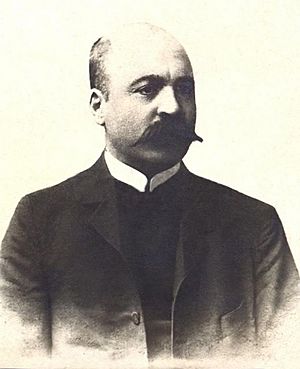Jalil Mammadguluzadeh facts for kids
Quick facts for kids
Jalil Mammadguluzadeh
|
|
|---|---|
 |
|
| Born |
Jalil Huseyngulu oghlu Mammadguluzadeh
22 February 1869 Nakhichevan (Nakhchivan), Nakhichevan uezd, Erivan Governorate, Russian Empire
|
| Died | 4 January 1932 (aged 62) |
| Education | Transcaucasian Teachers Seminary, Gori |
| Occupation | Teacher, journalist, writer |
| Spouse(s) | Nazli Kangarli (died 1903) Hamida Javanshir (1907–1932; his death) |
Jalil Mammadguluzadeh (born February 22, 1869 – died January 4, 1932) was an important Azerbaijani writer and satirist. A satirist is someone who uses humor, irony, or exaggeration to criticize people's mistakes or foolishness. He created Molla Nasraddin, a famous satirical magazine. This magazine had a big impact on writing in the Middle East and Central Asia.
Mammadguluzadeh was also one of the first people in Azerbaijan and the Middle East to support women's rights. He played a key role in starting the first magazine for women in Azerbaijan.
Contents
Biography of Jalil Mammadguluzadeh
Early Life and Education
Jalil Mammadguluzadeh was born in Nakhchivan, which is now part of Azerbaijan. When he was thirteen, he started learning Russian at the Nakhchivan city school. In 1882, he began studying at the Gori Pedagogical Seminary in Gori, Georgia. This is where he developed his ideas about the world.
After graduating in 1887, he spent ten years teaching in small towns and villages. These places were in the Erivan Governorate, a region that was part of the Russian Empire.
Mammadguluzadeh strongly believed in having a clear and unified Azeri language. He thought that many writers were making the language confusing. They were using too many words borrowed from Russian, Persian, and Ottoman Turkish. Later, he also helped change the Azeri alphabet to use Latin letters.
Career as a Writer and Editor
After finishing his studies in 1887, Mammadguluzadeh became a teacher in the Irevan province. In 1898, he moved to Yerevan. Then, in 1903, he moved to Tbilisi, a city in Georgia. There, he started writing for a local newspaper called Sharqi-Rus. This newspaper was published in the Azeri language.
His first short story, "The Postbox," was published in Sharqi-Rus. Another writer, Muhammad agha Shakhtakhtinski, encouraged him to publish more. In March 1903, Mammadguluzadeh met Omar Faig Nemanzade, who also became a well-known journalist. However, Sharqi-Rus closed down in 1905 after only two years.
In 1906, Mammadguluzadeh started his own satirical magazine called Molla Nasraddin. Because of many conflicts and unstable politics in the Caucasus region, he had to move to Tabriz, Iran. He continued to work there as the chief editor and writer for Molla Nasraddin.
About Molla Nasraddin Magazine
In 1905, Mammadguluzadeh and his friends bought a printing house in Tbilisi. In 1906, he became the editor of their new magazine, Molla Nasraddin. The magazine's name came from a wise and funny character from the 13th century, Molla Nasraddin. In Azeri, the name Nasraddin means "to tell it like it is." This showed readers that the magazine would bravely show the truth about politics.
The magazine used humor and pictures to show the problems in society during the early 1900s. It criticized old-fashioned customs and strict rules common in the Caucasus. The magazine used simple drawings and symbolic language to reach people who couldn't read. It also criticized conservative religious ideas and leaders.
Molla Nasraddin was banned in Iran and Turkey for a time. In one funny article, Mammadguluzadeh joked about the ban. He wrote that the magazine wanted more readers but was stopped from telling the truth about rulers.
After the Soviet Union took control of the region, Molla Nasraddin faced pressure to follow the Soviet government's rules. Because Mammadguluzadeh did not want to fully agree with their demands, Molla Nasraddin stopped being published in 1931. His unique satirical writing style greatly influenced other writers in the Middle East.
Later Life and Passing
In 1907, Jalil Mammadguluzadeh married Hamida Javanshir. She was an Azerbaijani who helped others and worked for women's rights. He eventually settled in Baku in 1921. Mammadguluzadeh passed away in Baku in 1932 when he was 62 years old.
His Literature and Writings
Jalil Mammadguluzadeh wrote many different kinds of stories and plays. These included short stories, novels, and plays. His first important short story was "The Disappearance of the Donkey." It was written in 1894 but published much later in 1934. This story talked about social inequality, meaning when some people have more advantages than others.
In his later works, like "The Postbox" and "The Lamb," he made fun of corruption, showing off, and religious extremism. His famous comedies, The Corpses and The Madmen Gathering, also poked fun at these issues. He also wrote a serious play called "Kamança" about the problems in the Karabakh region.
See also
 In Spanish: Jalil Mammadguluzade para niños
In Spanish: Jalil Mammadguluzade para niños
- Aligulu Gamgusar
 | Toni Morrison |
 | Barack Obama |
 | Martin Luther King Jr. |
 | Ralph Bunche |

